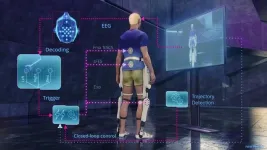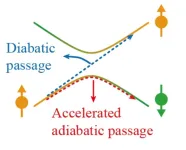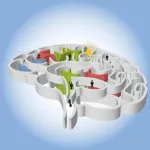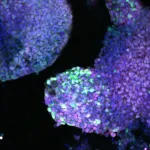(Press-News.org) Research Highlights:
An analysis of health data in the UK Biobank found a 20% higher risk of irregular heart rhythm, known as atrial fibrillation, among people who said they drank two liters or more per week (about 67 ounces) of artificially sweetened drinks. The risk was 10% higher among people who said they drank similar amounts of sugar-sweetened beverages.
Drinking one liter (about 34 ounces) or less of pure juice per week, such as 100% orange or vegetable juice, was associated with an 8% lower risk of atrial fibrillation.
The observational study could not confirm that sweetened drinks cause irregular heart rhythms.
Embargoed until 4 a.m. CT/5 a.m. ET Tuesday, March 5, 2024
DALLAS, March 5, 2024 — Adults who reported drinking two liters (about 67 ounces) or more of sugar- or artificially sweetened drinks per week had a higher risk of an irregular heart rhythm known as atrial fibrillation compared with adults who drank fewer such beverages, according to new research published today in Circulation: Arrhythmia and Electrophysiology, a peer-reviewed journal of the American Heart Association.
The study also found that drinking one liter (about 34 ounces) or less per week of pure, unsweetened juice, such as orange or vegetable juice, was associated with a lower risk of atrial fibrillation (AFib). However, the study could not confirm whether the sweetened drinks caused AFib, yet the association remained after accounting for a person’s genetic susceptibility to the condition.
Consuming sweetened drinks has been linked to Type 2 diabetes and obesity in previous research. This large study of health data in the UK Biobank is among the first to assess a possible link between sugar- or artificially sweetened beverages and AFib. Atrial fibrillation is a condition in which the heart beats irregularly, increasing the risk of stroke by five-fold. More than 12 million people are expected to have AFib by 2030, according to the American Heart Association’s 2024 Heart Disease and Stroke Statistics.
“Our study's findings cannot definitively conclude that one beverage poses more health risk than another due to the complexity of our diets and because some people may drink more than one type of beverage,” said lead study author Ningjian Wang, M.D., Ph.D., a researcher at the Shanghai Ninth People's Hospital and Shanghai Jiao Tong University School of Medicine in Shanghai, China. “However, based on these findings, we recommend that people reduce or even avoid artificially sweetened and sugar-sweetened beverages whenever possible. Do not take it for granted that drinking low-sugar and low-calorie artificially sweetened beverages is healthy, it may pose potential health risks.”
Researchers reviewed data from dietary questionnaires and genetic data for more than 200,000 adults free of AFib at the time they enrolled in the UK Biobank, between 2006 and 2010. During the nearly 10-year follow-up period, there were 9,362 cases of AFib among the study participants.
The analysis found:
Compared to people who did not consume any sweetened drinks, there was a 20% increased risk of atrial fibrillation among people who said they drank more than 2 liters per week (about 67 ounces or more, or roughly one 12-ounce drink 6 days a week) of artificially sweetened beverages; and a 10% increased risk among participants who reported drinking 2 liters per week or more of sugar-sweetened beverages.
People who said they drank 1 liter (about 34 ounces) or less of pure fruit juice each week had an 8% lower risk of atrial fibrillation.
Participants who consumed more artificially sweetened beverages were more likely to be female, younger, have a higher body mass index and a higher prevalence of Type 2 diabetes.
Participants who consumed more sugar-sweetened beverages were more likely to be male, younger, have a higher body mass index, a higher prevalence of heart disease and lower socioeconomic status.
Those who drank sugar-sweetened beverages and pure juice were more likely to have a higher intake of total sugar than those who drank artificially sweetened drinks.
Smoking may have also affected risk, with smokers who drank more than two liters per week of sugar-sweetened beverages having a 31% higher risk of AFib, whereas no significant increase risk was noted for former smokers or people who never smoked.
“These novel findings on the relationships among atrial fibrillation risk and sugar- and artificially sweetened beverages and pure juice may prompt the development of new prevention strategies by considering decreasing sweetened drinks to help improve heart health,” Wang said.
Researchers also evaluated whether a genetic susceptibility to AFib was a factor in the association with sweetened beverages. The analysis found the AFib risk was high with the consumption of more than 2 liters of artificially sweetened drinks per week regardless of genetic susceptibility.
“Although the mechanisms linking sweetened beverages and atrial fibrillation risk are still unclear, there are several possible explanations, including insulin resistance and the body’s response to different sweeteners,” Wang said. “Artificial sweeteners in food and beverages mainly include sucralose, aspartame, saccharin and acesulfame.”
A 2018 science advisory from the American Heart Association noted that there is a scarcity of large, long-term, randomized trials on the efficacy and safety of artificial sweeteners. The writing group advised against prolonged consumption of low-calorie sweetened beverages by children; however, they noted artificially sweetened drinks may be a useful replacement strategy to reduce consumption of sugar-sweetened beverages among adults who habitually drink a high number of sugar-sweetened drinks.
American Heart Association nutrition committee member Penny M. Kris-Etherton, Ph.D., R.D., FAHA, said these findings on artificially sweetened beverages are surprising “given that two liters of artificially sweetened beverages a week is equivalent to about one 12-ounce diet soda a day.”
Kris-Etherton, an emeritus professor of nutritional sciences at Penn State University, was a co-author of the association’s science advisory on artificial sweeteners.
“This is the first study to report an association between no- and low-calorie sweeteners and also sugar-sweetened beverages and increased risk of atrial fibrillation,” she said. “While there is robust evidence about the adverse effects of sugar-sweetened beverages and cardiovascular disease risk, there is less evidence about adverse health consequences of artificial sweeteners.
“We still need more research on these beverages to confirm these findings and to fully understand all the health consequences on heart disease and other health conditions. In the meantime, water is the best choice, and, based on this study, no- and low-calorie sweetened beverages should be limited or avoided.”
The American Heart Association’s 2016 dietary guidelines align with the U.S.D.A.’s 2020-2025 Dietary Guidelines for Americans in suggesting sugar-sweetened beverage consumption be minimized; they also note there is unclear evidence of the role of no- and low-calorie sweeteners on many health outcomes. The American Heart Association recommends limited intake of sugar-sweetened beverages, such as such as soft drinks, fruit drinks, sports drinks, energy drinks, sweetened teas and coffee drinks. Healthy beverage options noted are water and fat-free or low-fat milk, while unsweetened fresh, frozen or packaged fruit juice is recommended instead of fruit juice with added sugar. A half cup of pure juice (such as orange juice or grapefruit juice) is recognized as one fruit serving.
Study background and details:
The UK Biobank is a large, biomedical database with health records for about 500,000 adults — enrolled from 2006 until 2010 — who lived in the U.K. and received health care through the U.K.’s National Health Service.
Data was reviewed for 201,856 participants of the U.K. Biobank, ranging in age from 37 to 73 years old, and 45% were male.
Participants were followed for an average of nearly 10 years.
Blood samples were collected to measure genetic risk for AFib, and participants answered more than one 24-hour questionnaire about their diet on five repeated occasions between April 2009 and June 2012.
The limitations of this study include that the findings were observational and cannot prove causation between consumption of certain types of beverages and AFib risk. In addition, the findings relied on participants to recall their own diets, so there may have been memory errors or bias. It is also unknown if the sugar- and artificially sweetened drinks contained caffeine.
Co-authors, disclosures and funding sources are listed in the manuscript.
Studies published in the American Heart Association’s scientific journals are peer-reviewed. The statements and conclusions in each manuscript are solely those of the study authors and do not necessarily reflect the Association’s policy or position. The Association makes no representation or guarantee as to their accuracy or reliability. The Association receives funding primarily from individuals; foundations and corporations (including pharmaceutical, device manufacturers and other companies) also make donations and fund specific Association programs and events. The Association has strict policies to prevent these relationships from influencing the science content. Revenues from pharmaceutical and biotech companies, device manufacturers and health insurance providers and the Association’s overall financial information are available here.
Additional Resources:
Multimedia is available on the right column of release link https://newsroom.heart.org/news/sweetened-drinks-linked-to-atrial-fibrillation-risk?preview=ba1fcbec8dccf592bc262860c8468c0a
After March 5, view the manuscript online.
AHA health information: Sip Smarter Infographic
AHA news release: California study finds drinking sugary drinks daily may be linked to higher risk of CVD in women (May 2020)
AHA news release: Drinks with added sugars linked to lipid imbalance, which increases CVD risk (Feb. 2020)
Follow AHA/ASA news on Twitter @HeartNews
Follow news from the AHA’s Circulation: Arrhythmia and Electrophysiology journal @CirculationEP
About the American Heart Association
The American Heart Association is a relentless force for a world of longer, healthier lives. We are dedicated to ensuring equitable health in all communities. Through collaboration with numerous organizations, and powered by millions of volunteers, we fund innovative research, advocate for the public’s health and share lifesaving resources. The Dallas-based organization has been a leading source of health information for a century. During 2024 - our Centennial year - we celebrate our rich 100-year history and accomplishments. As we forge ahead into our second century of bold discovery and impact, our vision is to advance health and hope for everyone, everywhere. Connect with us on heart.org, Facebook, X or by calling 1-800-AHA-USA1.
###
END
Sweetened drinks linked to atrial fibrillation risk
Drinking sugar- or artificially sweetened beverages was associated with increased risk of irregular heart rhythms, finds a study in Circulation: Arrhythmia and Electrophysiology
2024-03-05
ELSE PRESS RELEASES FROM THIS DATE:
Hazardous heat and humidity is widespread in US jails and prisons, and climate change is worsening conditions
2024-03-05
An estimated 1.8 million incarcerated people in the United States have been recently exposed to a dangerous combination of heat and humidity, and on average experience 100 days of these conditions each year—many of them in the 44 states that do not provide universal air conditioning to inmates. Tracking with climate change, in recent decades, the number of dangerous humid heat days in carceral facilities has increased, with those in the south experiencing the most rapid warming.
The findings by researchers at Columbia University Mailman School of Public Health, Montana State University, ...
8 in 10 lizards could be at risk due to deforestation
2024-03-05
In Colorado, people flock to the Rocky Mountains when the summer heat gets unbearable. Animals seek shelter too when temperatures become extreme, and forests serve as critical sanctuaries for small tree-dwelling animals like lizards.
In a new study published March 5 in the journal Nature Climate Change, scientists from the University of Colorado Boulder and Tel Aviv University in Israel revealed that deforestation combined with climate change could negatively impact 84% of North America’s lizards by ...
Major neurotech hub in Milan announced
2024-03-05
The IRCCS San Raffaele Hospital and the Vita-Salute San Raffaele University announced the launch of a long-term partnership with the recently established Nicolelis Institute for Advanced Brain Studies of the Brazilian Alberto Santos Dumont Association for Research Support (AASDAP, www.aasdap.org.br) aimed at creating a state-of-the-art Neurotech Hub on their campus in the city of Milan. Resulting from a two-year planning process, that included the development of a comprehensive Master Plan, the San Raffaele Neurotech Hub will be the first initiative of this kind in Europe focused on deploying ...
Special insecticide paint may help curb zika and dengue fever outbreaks
2024-03-05
Malaria and other illnesses caused by parasites, viruses, and bacteria transmitted by organisms that spread infectious pathogens account for more than 17% of all infectious diseases worldwide. These vector-borne diseases, typically transmitted by insects like mosquitoes, flies, and ticks, disproportionally affect the poorest populations in tropical and subtropical regions.
In Cabo Verde, an island nation off west Africa, vector-borne disease has been prevalent for centuries, in part due to the island’s geographical location ...
Shortcut to Success: Toward fast and robust quantum control through accelerating adiabatic passage
2024-03-05
Osaka, Japan – Researchers at Osaka University’s Institute of Scientific and Industrial Research (SANKEN) used the shortcuts to the adiabaticity (STA) method to greatly speed-up the adiabatic evolution of spin qubits. The spin flip fidelity after pulse optimization can be as high as 97.8% in GaAs quantum dots. This work may be applicable to other adiabatic passage and will be useful for fast and high-fidelity quantum control.
A quantum computer uses the superposition of “0” and “1” states to perform information processing, which is completely different from classical computing, thus allowing for the solution of certain problems at a much faster rate. High-fidelity ...
Gen Z’s climate anxiety is real and needs action — for everyone’s wellbeing
2024-03-05
New Curtin University research has shown Australian young people have major concerns about climate change, which is having a significant impact on their lives and could have broader consequences decades into the future.
Published in Sustainable Earth Reviews, the study surveyed Australian university students belonging to Generation Z (people born between 1995 and 2010) and found climate change was their number one environmental concern.
More than 80 per cent reported being ‘concerned’ or ‘very concerned’ about climate change, with many revealing they felt anxious over the issue.
Climate anxiety ...
Proposals for cell donation procedures to create brain organoids
2024-03-05
With advances in neuroscience and the development of new technologies, new ethical considerations have emerged. This is particularly true for human brain organoids, which are three-dimensional tissues grown from stem cells that partially replicate the characteristics of the human brain. Brain organoids have emerged as important tools for studying brain development and disease, but there are concerns about the possibility of these organoids developing consciousness. This has important implications for research ethics and the need to obtain informed consent from cell donors.
To address these questions, an international team of researchers has sought to shed light on the intricate ...
Turning skin cells into limb cells sets the stage for regenerative therapy
2024-03-05
Fukuoka, Japan – In a collaborative study, researchers from Kyushu University and Harvard Medical School have identified proteins that can turn or “reprogram” fibroblasts — the most commonly found cells in skin and connective tissue — into cells with similar properties to limb progenitor cells. Publishing in Developmental Cell, the researchers’ findings have enhanced our understanding of limb development and have set the stage for regenerative therapy in the future.
Globally, close to 60 ...
NUS researchers invent new triple-junction tandem solar cells with world-record efficiency
2024-03-05
Scientists from the National University of Singapore (NUS) have developed a novel triple-junction perovskite/Si tandem solar cell that can achieve a certified world-record power conversion efficiency of 27.1 per cent across a solar energy absorption area of 1 sq cm, representing the best-performing triple-junction perovskite/Si tandem solar cell thus far. To achieve this, the team engineered a new cyanate-integrated perovskite solar cell that is stable and energy efficient.
Solar cells can be fabricated ...
Quantum computing will radically alter the application of copyright law, study says
2024-03-05
Quantum computing will radically transform the application of the law – challenging long-held notions of copyright, a new study says.
Faster computing will bring exponentially greater possibilities in the tracking and tracing of the legal owners of art, music, culture and books.
This is likely to mean more copyright infringements, but also make it easier for lawyers to clamp down on lawbreaking. However, faster computers will also be able to potentially break and get around certain older enforcement technologies.
The research says quantum computing ...
LAST 30 PRESS RELEASES:
Scientists show how to predict world’s deadly scorpion hotspots
ASU researchers to lead AAAS panel on water insecurity in the United States
ASU professor Anne Stone to present at AAAS Conference in Phoenix on ancient origins of modern disease
Proposals for exploring viruses and skin as the next experimental quantum frontiers share US$30,000 science award
ASU researchers showcase scalable tech solutions for older adults living alone with cognitive decline at AAAS 2026
Scientists identify smooth regional trends in fruit fly survival strategies
Antipathy toward snakes? Your parents likely talked you into that at an early age
Sylvester Cancer Tip Sheet for Feb. 2026
Online exposure to medical misinformation concentrated among older adults
Telehealth improves access to genetic services for adult survivors of childhood cancers
Outdated mortality benchmarks risk missing early signs of famine and delay recognizing mass starvation
Newly discovered bacterium converts carbon dioxide into chemicals using electricity
Flipping and reversing mini-proteins could improve disease treatment
Scientists reveal major hidden source of atmospheric nitrogen pollution in fragile lake basin
Biochar emerges as a powerful tool for soil carbon neutrality and climate mitigation
Tiny cell messengers show big promise for safer protein and gene delivery
AMS releases statement regarding the decision to rescind EPA’s 2009 Endangerment Finding
Parents’ alcohol and drug use influences their children’s consumption, research shows
Modular assembly of chiral nitrogen-bridged rings achieved by palladium-catalyzed diastereoselective and enantioselective cascade cyclization reactions
Promoting civic engagement
AMS Science Preview: Hurricane slowdown, school snow days
Deforestation in the Amazon raises the surface temperature by 3 °C during the dry season
Model more accurately maps the impact of frost on corn crops
How did humans develop sharp vision? Lab-grown retinas show likely answer
Sour grapes? Taste, experience of sour foods depends on individual consumer
At AAAS, professor Krystal Tsosie argues the future of science must be Indigenous-led
From the lab to the living room: Decoding Parkinson’s patients movements in the real world
Research advances in porous materials, as highlighted in the 2025 Nobel Prize in Chemistry
Sally C. Morton, executive vice president of ASU Knowledge Enterprise, presents a bold and practical framework for moving research from discovery to real-world impact
Biochemical parameters in patients with diabetic nephropathy versus individuals with diabetes alone, non-diabetic nephropathy, and healthy controls
[Press-News.org] Sweetened drinks linked to atrial fibrillation riskDrinking sugar- or artificially sweetened beverages was associated with increased risk of irregular heart rhythms, finds a study in Circulation: Arrhythmia and Electrophysiology





